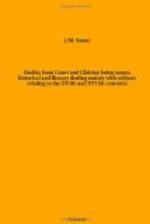The great dearth of learned preachers and confessors that prevailed about the middle of the sixteenth century appealed strongly to the Jesuits to throw themselves into the breach, and thus against the original intention of their founder, they became the spiritual guides of those who made the history of Europe for the next hundred years and more. It was a delicate and an onerous task, fraught with temptations from without and from within.
Ignatius of Loyola, being a man of the world as well as a saint, was well aware of the perils to which he exposed his sons, in sending them forth into the midst of vanities, while at the same time, having had some experience of courts, he knew that princes love not contradiction. But he decided after mature deliberation that after all his “least Society” was created to do a certain work in the Church and in the world, the need of which work was only too apparent in the decayed state of faith and morals. It was not by turning his back on courts that he could hope to regenerate them; but it would be interesting could we discover whether by a contrary decision he would have averted some of the odium which the name Jesuit has accumulated in the course of ages.
John iii. of Portugal was the first king to demand a Jesuit confessor, and to him Ignatius sent Father Luis Gonzalez de Comara, much against the desire of the said individual. To his entreaties and objections the first General of the Society made answer, on the 9th August 1552, that he was indeed edified by the humility which caused Father de Comara to shrink from a position which many envied; nevertheless, he was of the opinion that he should obey his Highness in this, as in other things, “for the honour of God our Lord.” St. Ignatius went on to say that he need not occupy himself with any but good and pious objects, neither had he reason to fear that the king would, against the will of the Society, confer upon him those honours and dignities with which it was the custom to distinguish other confessors. If moreover, his remaining at court was a cross to him, he must bear it with patience as he would all else that obedience required of him.
At the second General Congregation held in 1565, the question arose whether Cardinal Otto of Augsburg might have a member of the Society attached to his court, as theologian. The Congregation decided not to allow any member to reside permanently at the court of any prince, spiritual or secular, or to consent to his following the said court on its travels, either in the capacity of preacher, theologian or confessor, and that no appointment of such a kind should be permissible for longer than one month or double that period at the most.
Ten years later, the Provincial Congregation of North Germany was reminded of this decree in drawing up propositions to be placed before the third General Congregation, and it was expressly stated that none but the General of the Society himself should have the power to make such appointments, that they should be made as rarely as possible, experience having proved that more harm was done to the confessor by his residing at court than good to the penitent by his ministrations. The reply to this proposition was to the effect that with the General alone should rest the appointment.




